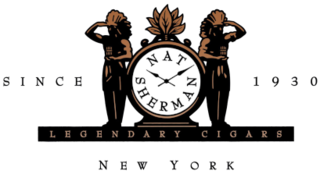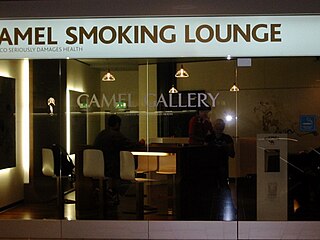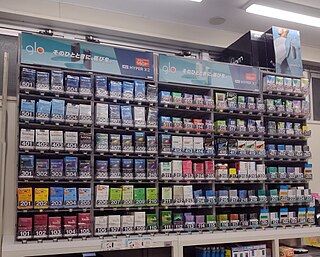Related Research Articles

A cigar is a tobacco product made to be smoked. Cigars are produced in a variety of shapes and sizes. Since the 20th century, almost all cigars are made of three distinct components: the filler, the binder leaf which holds the filler together, and a wrapper leaf, for appearance and flavor, which is often the highest quality leaf used. Often there will be a cigar band printed with the cigar manufacturer's logo. Modern cigars can come with two or more, highlighting special qualities such as age and origin of the tobaccos used.

Smoking bans, or smoke-free laws, are public policies, including criminal laws and occupational safety and health regulations, that prohibit tobacco smoking in certain spaces. The spaces most commonly affected by smoking bans are indoor workplaces and buildings open to the public such as restaurants, bars, office buildings, schools, retail stores, hospitals, libraries, transport facilities, and government buildings, in addition to public transport vehicles such as aircraft, buses, watercraft, and trains. However, laws may also prohibit smoking in outdoor areas such as parks, beaches, pedestrian plazas, college and hospital campuses, and within a certain distance from the entrance to a building, and in some cases, private vehicles and multi-unit residences.

Nat Sherman is the brand name for a line of handmade cigars and "luxury cigarettes". The company, which began as a retail tobacconist, continued to operate a flagship retail shop, known as the "Nat Sherman Townhouse", located on 42nd Street, off Fifth Avenue, in New York City from 1930 to 2020. Corporate offices are now located at the foot of the George Washington Bridge in Fort Lee, New Jersey.

A tobacconist, also called a tobacco shop, a tobacconist's shop or a smoke shop, is a retailer of tobacco products in various forms and the related accoutrements, such as pipes, lighters, matches, pipe cleaners, and pipe tampers. More specialized retailers might sell ashtrays, humidification devices, hygrometers, humidors, cigar cutters, and more. Books and magazines, especially ones related to tobacco are commonly offered. Items irrelevant to tobacco such as puzzles, games, figurines, hip flasks, walking sticks, and confectionery are sometimes sold.

Because of the damage to health due to smoking in the United Kingdom it may be the first country to ban sales of cigarettes to people born after 2008.

The New Jersey Smoke-Free Air Act is a comprehensive smoking ban that took effect in New Jersey on April 15, 2006. The law prohibits smoking in most workplaces as well as in indoor public areas. The Act has been amended a number of times including in 2009 to extend the ban to electronic smoking devices and in 2018 to extend the ban to public parks and beaches. A notable exception to the smoking ban is in casinos, but legislation to remove this exception is currently pending in the New Jersey Legislature. The New Jersey Smoke-Free Air Act also allows municipalities to enact their own restrictions on smoking.
The loi Évin is the French alcohol and tobacco policy law passed in 1991. It takes its name from Claude Évin, then Minister of Health, who proposed it to Parliament.

A hookah lounge is an establishment where patrons share shisha from a communal hookah or from one placed at each table or a bar.

A smoking room is a room which is specifically provided and furnished for smoking, generally in buildings where smoking is otherwise prohibited.

Smoking in Japan is practiced by around 20,000,000 people, and the nation is one of the world's largest tobacco markets, though tobacco use has been declining in recent years.

SmokinginCanada is banned in indoor public spaces, public transit facilities and workplaces, by all territories and provinces, and by the federal government. As of 2010, legislation banning smoking within each of these jurisdictions is mostly consistent, despite the separate development of legislation by each jurisdiction. Notable variations between the jurisdictions include: whether, and in what circumstances ventilated smoking rooms are permitted; whether, and up to what distance away from a building is smoking banned outside of a building; and, whether smoking is banned in private vehicles occupied by children.
Smoking in Ireland is banned fully in the general workplace, enclosed public places, restaurants, bars, education facilities, healthcare facilities and public transport. However, it is permitted in designated hotel rooms and there is no ban in residential care, prisons and in outdoor areas. Public opinion is in favour of the bans on smoking imposed in Ireland.

There are approximately 57 million smokers in Indonesia, among a population of 273 million people. Around 63% of men and 5% of women report smoking, equating to 34% of the population. The majority, 88% of Indonesian smokers, use clove-flavoured kreteks. Kretek manufacturers directly employ over 180,000 people in Indonesia and an additional 10 million indirectly. Indonesia is the fifth largest tobacco market in the world, and in 2008 over 165 billion cigarettes were sold in the country.
Tobacco is an agricultural product acting as a stimulant triggering complex biochemical and neurotransmitter disruptions. Its main ingredient is nicotine and it is present in all cigarettes. Early tobacco usage was for medical cures and religious purposes. In the early 1900s, cigarette usage became increasingly popular when it was sold in mass amounts. In 1964, the Surgeon General of the United States wrote a report concerning the dangers of cigarette smoking. In the United States, for the past 50 years efforts have been made so that the public should be aware of the risks of tobacco usage.

Smoking in India is one of the oldest industries and provides livelihood to more than five million people directly and indirectly. India is the second-largest producer of tobacco in the world. Smoking has been known since at least 2000 BC when cannabis was smoked and is first mentioned in the Atharvaveda. Fumigation (dhupa) and fire offerings (homa) are prescribed in the Ayurveda for medical purposes and have been practiced for at least 3,000 years while smoking, dhumrapana has been practiced for at least 2,000 years. Tobacco was introduced to India in the 17th century. It later merged with existing practices of smoking.

A vape shop is a retail outlet specializing in the selling of vaping products, though shops selling derived psychoactive cannabis products have increased since the passage of the 2018 Farm Bill. There are also online vape shops. A vape shop offers a range of vaping products. The majority of vape shops do not sell vaping products that are from "Big Tobacco" companies. In 2013, online search engine searches on vape shops surpassed searches on e-cigarettes. Around a third of all sales of vaping products take place in vape shops. Big Tobacco believes the independent vape market is a threat to their interests.

As nicotine is highly addictive, marketing nicotine-containing products is regulated in most jurisdictions. Regulations include bans and regulation of certain types of advertising, and requirements for counter-advertising of facts generally not included in ads. Regulation is circumvented using less-regulated media, such as Facebook, less-regulated nicotine delivery products, such as e-cigarettes, and less-regulated ad types, such as industry ads which claim to discourage nicotine addiction but seem, according to independent studies, to promote teen nicotine use.
References
- ↑ Cigar Sensibilities by Roy Stein Archived 2017-02-23 at the Wayback Machine - Cigarfriendly.com
- ↑ "The Cigar Bar". Rapid Detect. Rapid Detect Inc. 27 March 1997. Archived from the original on 2 January 2015. Retrieved 20 July 2010.
- ↑ Directory of Post-Ban Cigar Bars - CigarPlaces.com
- ↑ The Age , "The cigar bar makes a comeback" article, 28 December 2010
- ↑ "Cigar bar owners puffed up with glee as butt ban nears". Montreal Gazette . May 23, 2006. Archived from the original on May 12, 2014. Retrieved February 13, 2014.
- ↑ Jennifer Cox (February 6, 2012). "Top 7 Canadian cigar lounges and shops". Crave Canada. Retrieved February 13, 2014.
- ↑ "CIGAR EDITORIAL: ALBERTA, CANADA BLINKS ON CIGAR LOUNGES". 15 July 2021.
- ↑ "Tobacco Reduction Regulation, Alta Reg 240/2007 | CanLii".
- ↑ "New café risking fines over shisha smoking | Montreal Gazette".
- ↑ "Pikku Havanna". pikkuhavanna.fi (in Finnish). Retrieved 2021-02-26.
- ↑ UK Legislation. legislation.gov.uk https://www.legislation.gov.uk/uksi/2007/765/regulation/7/made/data.xht?view=snippet&wrap=true . Retrieved 25 May 2023.
{{cite web}}: Missing or empty|title=(help) - ↑ Hacker, Richard Carleton (17 February 2015). "Roll On, Britannia". Robb Report. Retrieved 25 May 2023.
- ↑ "There's a museum in James J Fox, London's oldest cigar shop". ianVisits. 23 November 2021. Retrieved 25 May 2023.
- ↑ "Cigar smoking enjoys a revival in UK". The Independent. 9 January 2014. Retrieved 25 May 2023.
- ↑ Private Smoking Club Google Answers
